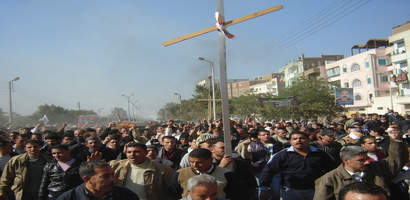 The shootout which targeted the Copts as they left church following Midnight Mass on Christmas Eve in the Upper Egyptian town of Nag Hammadi, is still reverberating shock waves inside and outside Egypt. Visitors to Nag Hammadi in the wake of the shootout came back with harrowing tales of the climate of terror and fear which envelops the Copts there. The bitter foreboding of evil is ever-present, not only among those who were directly hit by the shootout on Christmas Eve, but by mainstream Copts who can no longer feel secure about what tomorrow holds. Many lock themselves up in their homes, since the bitter reality witnesses to the fact that they may become the next victims. Not because they have done anything wrong, but for the mere fact that they are Copts, they may be targeted by persons they have never seen to settle accounts on issues they know nothing of.
The shootout which targeted the Copts as they left church following Midnight Mass on Christmas Eve in the Upper Egyptian town of Nag Hammadi, is still reverberating shock waves inside and outside Egypt. Visitors to Nag Hammadi in the wake of the shootout came back with harrowing tales of the climate of terror and fear which envelops the Copts there. The bitter foreboding of evil is ever-present, not only among those who were directly hit by the shootout on Christmas Eve, but by mainstream Copts who can no longer feel secure about what tomorrow holds. Many lock themselves up in their homes, since the bitter reality witnesses to the fact that they may become the next victims. Not because they have done anything wrong, but for the mere fact that they are Copts, they may be targeted by persons they have never seen to settle accounts on issues they know nothing of.Tales from Nag Hammadi testify first hand to the appalling climate of hatred which reigns there. Concepts such as the homeland, citizenship rights, safety or security, are put to shame before the prevailing hatred—the natural outcome of discriminative, divisive policies which insist on ‘religionising’ everything in our life, in favour of Islam and against Christianity.
A plethora of declarations, statements, and writings have strongly condemned the shootout against the Copts and the morbid climate which made it possible. This in itself is an encouraging indicator, but the question which begs an answer is whether all such talk will remain mere ‘condolence rhetoric’ or could materialise into real change.
Those sceptical of any change may be obviously excused for their wariness. Throughout the last four decades the State has refrained from implementing policies against the escalating religious fundamentalism which has gradually taken over Egypt on all religious, social cultural, educational, and political fronts.
Among the many statements issued by political parties and rights groups, the one by the National Council for Human Rights (NCHR) especially caught my attention, not least because the NCHR is a State entity that has long called for reform, full citizenship rights and equality among Egyptians. In unprecedented candour, the statement diagnosed the Egyptian illness and prescribed a cure, confirming that it will be presented to the president of the republic.
The NCHR strongly drew attention to the new type of terrorist operations executed by individuals who do not belong to regular sectarian or violent groups. This, the statement said, raises grave concerns about the political climate surrounding such criminal terrorists, their incentives and the identity of whoever is using them to destabilise our community and wreck the national fabric. The NCHR called for an iron-fisted policy against fanaticism and sectarianism, and for harsh penalties against criminals who target Copts, since such criminals have so far been meted none or very mild penalties. In this respect the NCHR said the law must rule over all indiscriminately; so-called reconciliation sessions should be no more than supplementary action to resolve problems and should never replace the law.
Victims of violence and terrorism should be indemnified for their losses by the government and the civil society organisations, the NCHR said. This should serve to consolidate citizenship concepts and equality. Moreover, officials concerned should be taken to account, no matter how high they rank. This, the statement said, confirms the need to apply selective measures to appoint the most able and experienced individuals for public office.
The NCHR stressed that it should be clearly confirmed that Egypt is a civil State based on citizenship rights. The media should stop transmitting material that promotes religionising the State or that deepens divisions between children of the homeland. Curricula and teacher attitude in schools should be monitored in order to stress that the homeland is not exclusive to any one group of Egyptians.
New legislation is required, the statement stressed, to criminalise discrimination and the promotion of hatred. A unified law for building places of worship should be passed, in confirmation of the constitutional texts which stipulate equality in freedom of expression, worship, and conducting religious rites.
The most important point about the NCHR statement is that it would be raised to President Mubarak. Previous statements and actions on citizenship rights and violence against Copts have frequently faltered while awaiting presidential action. Now that the situation has reached intolerable proportions, Copts are asking: Where is President Mubarak? Following the Nag Hammadi incident, Egypt—Muslims and Copts alike—looks up to President Mubarak for decisive action to heal the nation.




